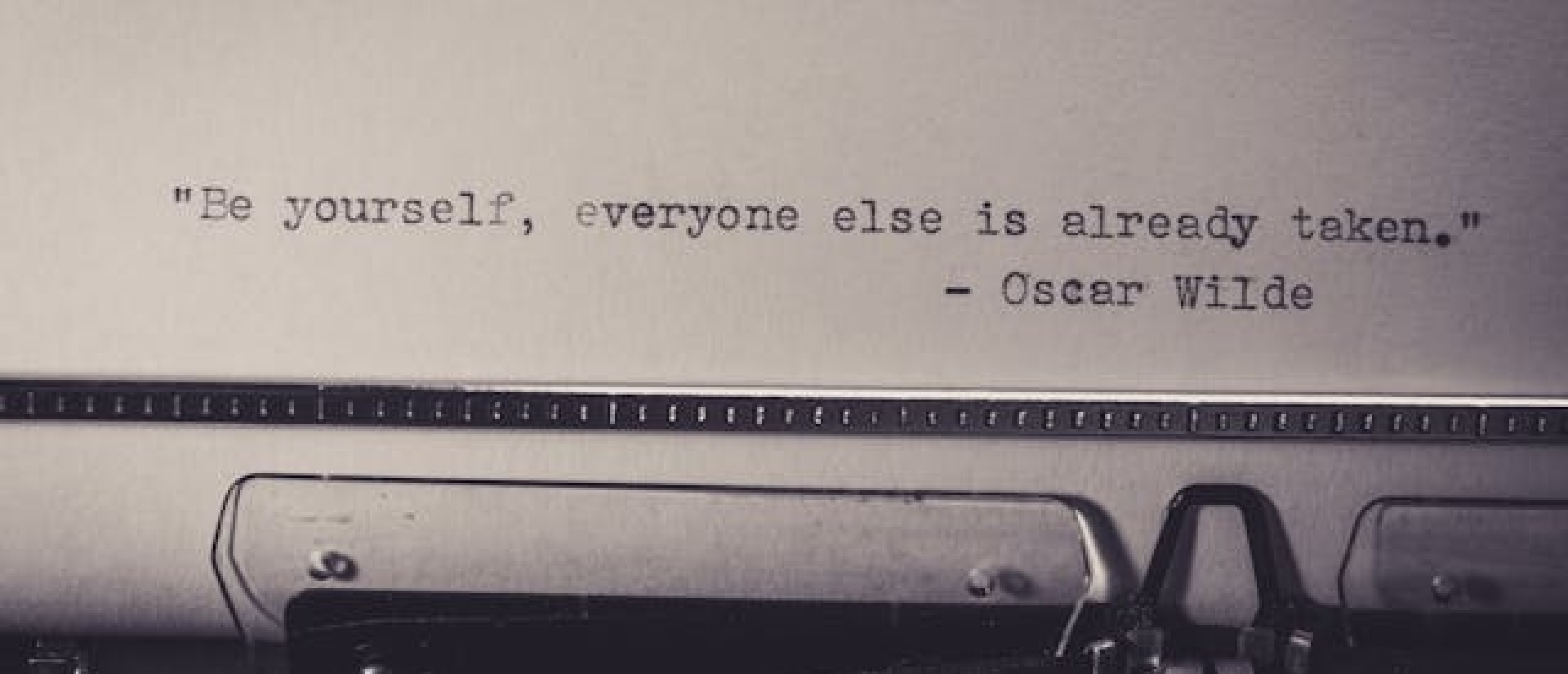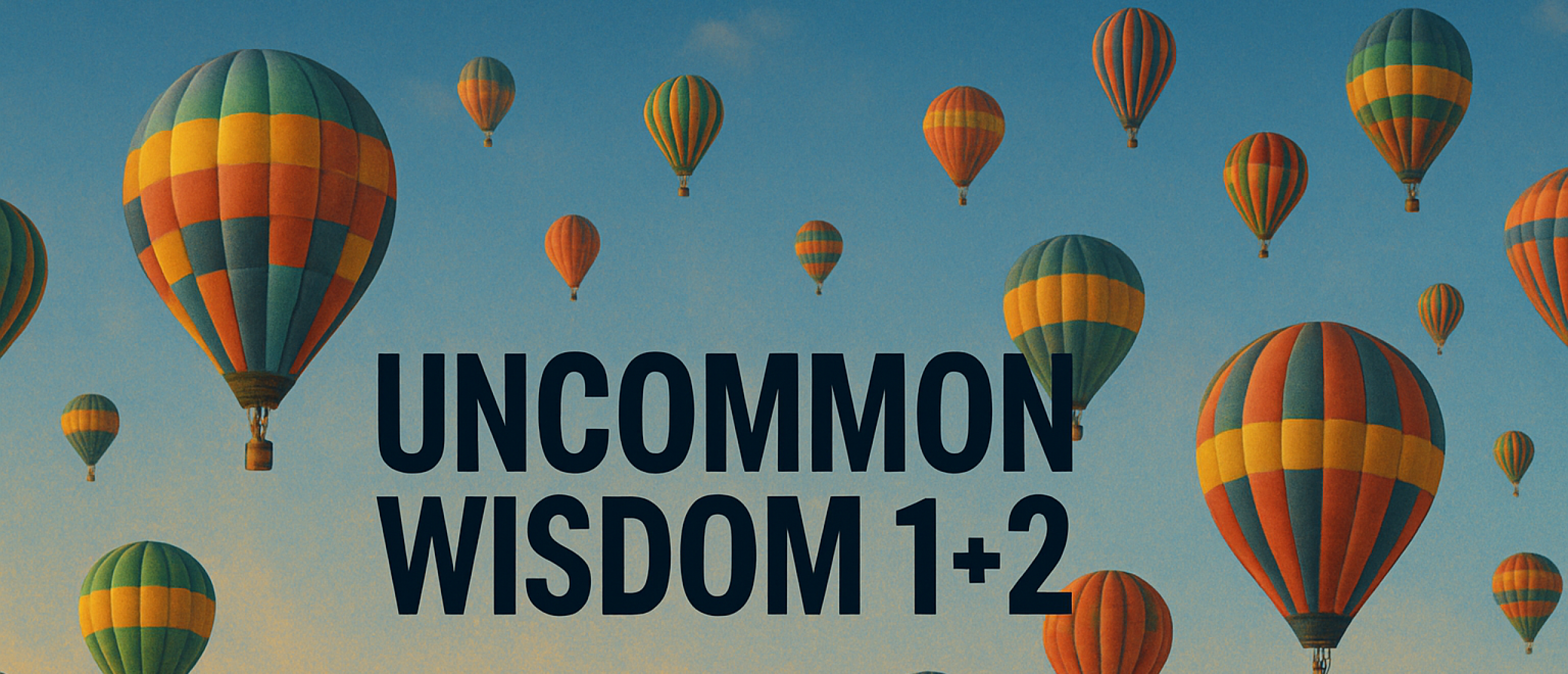
And now for some Uncommon wisdoms…Why uncommon wisdoms?
The Course is unconventional – in fact it is radical. We have been conditioned for centuries to pursue freedom while remaining safe. The Course takes this cautious mode of thinking and turns it on its head. The teachings are extremely wise and unconventional because there is no part that reinforces our addiction to fear based thinking. The Course informs us that we are safe- period. And - We don’t believe it – period. That’s why we need a course.
We have approached this collection of what we call uncommon wisdoms by organizing them based on three principles that sum up the course very succinctly. The three principles are adapted from the book The Course in Miracles in Five Minutes by Jerry Sears. Sears summarizes the key concepts of the Course in a brilliantly simple manner:
- The Universe is friendly
- I am an innocent child of that friendly universe
- So are you.
These three principles are true all the time, no matter what.
It is easy to believe all three when things are going our way and life seems good. It is not so easy when challenges appear. The true work of ACIM is knowing all three are true no matter what; all the time. We repeat NO MATTER WHAT. The test that we are doing the work is knowing these three principles are true and acting accordingly.
Yet how quickly do we lose the knowledge that others are innocent when they cut us off in traffic for instance? Do you say “oh that’s just another ICOG (Innocent Child of God -thanks David Tih for the acronym) doing what he/she needs to do? Or do you say !@?%!?
That’s an easy one – what if what is happening is more serious? Your wife or husband has just announced they want to leave your relationship, your best friend has been hurt, and your kids are not doing well at school? You lose someone you love. Whose innocence goes first? The Universe (not so friendly after all), yours – I’m not good enough – or another’s – they are a bunch of idiots.
Keeping all three of these principle in alignment while being challenged forms for each of us a unique curriculum lovingly created to bring us home.
Let’s go further with each of these ideas.
Principle 1: The Universe is friendly/benevolent:
A favourite quote of ours from the Course is found in Lesson 135 paragraph 18
What could you not accept if you but knew that everything that happens, all events, past, present and to come, are gently planned by One whose only purpose is your good? Perhaps you have misunderstood His plan, for he would never offer pain to you. But your defenses did not let you see His loving blessing shine in every step you ever took. While you made plans for death, he led you gently to eternal life.
Isn’t that beautiful?
If we really knew that the universe was looking out for us we would all behave very differently. Trusting that all things are in divine right order is one of the biggest tests of spiritual adulthood. The course lets us know in several passages a large part of all our learning is in learning to trust.
Manual for Teachers chapter 4, paragraph 1 and 2
1.Trust
This is the foundation on which their ability to fulfill their function rests. Perception is the result of learning. In fact, perception is learning, because cause and effect are never separated. The teachers of God have trust in the world because they have learned it is not governed by the laws the world made up. It is governed by a power that keeps all things safe. It is through this power that the teachers of God look on a forgiven world.
When this power has once been experienced, it is impossible to trust one’s own petty strength again. Who would attempt to fly with the tiny wings of a sparrow when the mighty power of an eagle has been given him? And who would place his faith in the shabby offerings of the ego when the gifts of God are laid before him?
Lesson 135 paragraph 19
Your present trust in Him is the defense that promises a future undisturbed, without a trace of sorrow, and with joy that constantly increase, as this life becomes a holy instant, set in time, but heeding immortality. Let no defenses but your present trust directs the future, and this life becomes a meaningful encounter with the truth that only your defenses would conceal.
And further states that all our problems are based on this one issue of trust.
Byron Katie has a great way of explaining this through her very succinct phrase. “everything is happening for me not to me.” When Einstein was asked “what is the most important question someone can ask?” his response was “is the universe a friendly place or not’? If I live my life believing the universe is friendly what a different view I have of everything that happens.
Take for example a common human experience: the person I am attracted to is not interested in me.
A friendly universe would say
“Much as you long for this person to share your feelings there is someone else who you are perfectly meant for.”
An unfriendly universe would say
“There’s something wrong with you. You are obviously not attractive enough, not interesting enough, it’s not worth even trying.”
How about a challenge of a different nature: my child is on drugs and I don’t know how to help him?
A friendly universe would say
Although this is a worrying situation your child is on a certain path and his lessons will come through this experience as will yours. This does not mean you do not seek help and support it simply means you can ask for help from a higher level.
An unfriendly universe would say
“OMG, this is terrible, he is a bad kid, you are a bad parent, this situation is hopeless, you should be ashamed.”
Going back to Einstein, until recently I had assumed he had a relatively easy life of a famous brilliant man, but he didn’t. He endured many hardships in his youth and in his older years and yet he still maintained the philosophy that the Universe was friendly. How is that?
Well, we think this is tied into what the Course calls the Special Function. it seems that many of us think this Special Function is something outside of us we need to seek for and confirm. It is much simpler than this. Our Special Function is not based on what we accomplish or what we do for a living. We all have the same Special Function and that is to take responsibility for all our experiences, learn and practice the lessons of forgiveness. Forgiveness for ourselves in terms of the beliefs that we hold that are false and gratitude to others for providing the lessons we so desperately need to learn.
In that sense, we are all the same and yet we each have a perfectly designed curriculum for our time on this planet. When we purposively step into taking conscious responsibility we each play our part in healing the world.
Remember: Lesson 130 paragraph 1
Perception is consistent. What you see reflects your thinking. And your thinking but reflects your choice of what you want to see. Your values are determiners of this, for what you value you must want to see, believing what you see is really there. No one can see a world his mind has not accorded value. And no one can fail to look upon what he believes he wants.
Principle 2: I am an innocent child of this benevolent universe
A Course in Miracles mentions who we are very few times. But it does mention what we are frequently. In fact, there is a whole section with the Lessons dedicated to this:
Lesson 360 What am I?
I am God’s son, complete and whole, shining in the reflection of His love. In me is creation sanctified and guaranteed eternal life. In me is love perfected, fear impossible, and joy established without opposite. I am the holy home of God Himself. I am the Heaven where His love resides. I am His holy sinlessness itself, for in my purity abides His own.
We are always searching for something better, more or different which means that what we are saying is that we are never enough. And yet when we arrive at more, better, different, it is also never enough. Our addiction is to the search, the search is always focussed out there. The key is in searching in entirely the other direction.
This means looking at the underside of this belief that I am not enough, I do not have enough, lacking in some way and ask ourselves soberly is it true?
All difficulty comes from thinking and focussing on the who I am rather than the what. Going back to the notion of a friendly universe and the human tendency to search for safety. All fear is based on a false belief of who we are.
We define ourselves by income, job, parenthood, relationship – and it gives us nothing because it is nothing!
We are innocence, magnificence, and love. Does it really matter if we are doctor or a street cleaner, that we have a nice house or live on the street? Not in God’s eyes!
Our task then is not to discover more of who we are because that can only be at the level of personality. Who am I is a circular question that sets me apart because it is singular, the answer can only be a specific individual definition. The question of what I am is collective and results in the knowledge that we are all the same. What a powerful realization! The Course is constantly encouraging us to go deeper and deeper into the Truth of what we all are. When we grasp this there is no need for war, greed, abuse in any form. Our tendency to play small, to lack courage, to view ourselves as anything other than magnificent will be seen as the ridiculous and harmful notion that it is.
Principle 3: And so are you… innocent that is!
A distinguishing feature of ACIM is its emphasis on relationship. Although each of our journeys is individual and unique, we need each other to get to our destination. It is through relationships (with primary partners, family members, friends, colleagues or random encounters) that we learn more about what we are and where we need to heal. We don’t go “home” alone, we all go together.
In all interactions with others many opportunities arise to help us heal. Usually they don’t feel very good at first and our tendency is to keep what is bothering us suppressed and in the dark.
All encounters are meaningful and holy. That does not mean they are all cozy and comfortable. Count yourself lucky if you have one or two people in your life who do not trigger discomfort in some way and the only solution is to learn to welcome the discomfort!
The role of relationship in A Course in Miracles: applies to both principles:
- I am an innocent child
- and so are you
En nu wat Ongewone Wijsheden… Waarom ongewone wijsheden?
De Cursus is onconventioneel – sterker nog, ze is radicaal. We zijn al eeuwenlang geconditioneerd om vrijheid na te streven terwijl we tegelijkertijd veiligheid zoeken. De Cursus keert deze voorzichtige manier van denken volledig om. De lessen zijn buitengewoon wijs én onconventioneel, omdat geen enkel deel onze verslaving aan angstgebaseerd denken bevestigt. De Cursus zegt ons dat we veilig zijn – punt. En – we geloven het niet – punt. Daarom hebben we een cursus nodig.
We hebben deze verzameling van wat wij ongewone wijsheden noemen samengesteld op basis van drie principes die de Cursus heel kernachtig samenvatten. Deze drie principes zijn afgeleid van het boek The Course in Miracles in Five Minutes van Jerry Sears. Sears vat de kernbegrippen van de Cursus op briljant eenvoudige wijze samen:
- Het universum is vriendelijk.
- Ik ben een onschuldig kind van dat vriendelijke universum.
- En jij ook.
Deze drie principes zijn altijd waar, ongeacht de omstandigheden.
Het is gemakkelijk om in alledrie te geloven als het leven meezit. Het is veel moeilijker wanneer er uitdagingen opduiken. Het ware werk van de Cursus is beseffen dat deze drie principes altijd waar zijn, wat er ook gebeurt. Wij herhalen: ONGEACHT WAT ER GEBEURT. Het bewijs dat we het werk echt doen, is dat we deze drie principes erkennen als waar én ernaar handelen.
Maar hoe snel verliezen we het besef van de onschuld van anderen – bijvoorbeeld wanneer iemand ons afsnijdt in het verkeer? Zeg je dan: “Oh, dat is gewoon een ander OKVG’tje (Onschuldig Kind van God – dank aan David Tih voor het acroniem) die doet wat hij/zij denkt te moeten doen?” Of roep je iets als “@!#%!”?
Dat is een makkelijke test – maar wat als het serieus wordt?
Je partner zegt dat hij of zij de relatie wil verlaten, je beste vriend(in) is gewond geraakt, of je kinderen doen het slecht op school? Je verliest iemand van wie je houdt. Wiens onschuld verdwijnt dan het eerst?
- Het universum (blijkbaar toch niet zo vriendelijk)?
- Die van jou – “ik ben niet goed genoeg”?
- Of die van de ander – “ze zijn allemaal idioten”?
Het vasthouden aan alle drie de principes, zelfs in tijden van beproeving, vormt voor ieder van ons een uniek leerplan dat liefdevol is samengesteld om ons terug naar huis te leiden.
Laten we elk van deze principes verder uitwerken.
Principe 1: Het Universum is vriendelijk/weldoend
Een van onze favoriete citaten uit de Cursus is te vinden in Les 135, paragraaf 18:
“Wat zou je niet kunnen aanvaarden als je maar wist dat alles wat gebeurt, alle gebeurtenissen in het verleden, heden en toekomst, zachtjes worden geleid door Iemand Wiens enig doel jouw welzijn is? Misschien heb je Zijn plan verkeerd begrepen, want Hij zou jou nooit pijn geven. Maar jouw verdedigingen lieten je Zijn liefdevolle zegen niet zien die in elke stap die je ooit zette aanwezig was. Terwijl jij plannen maakte voor de dood, leidde Hij je zachtjes naar het eeuwige leven.”
Is dat niet prachtig?
Als we echt wisten dat het universum het beste met ons voorheeft, zouden we ons allemaal heel anders gedragen. Vertrouwen dat alles in goddelijke orde verloopt, is een van de grootste beproevingen van geestelijke volwassenheid. De Cursus zegt op meerdere plaatsen dat een groot deel van ons leerproces draait om leren vertrouwen.
Handboek voor leraren, hoofdstuk 4, paragraaf 1 en 2:
1. Vertrouwen
Dit is het fundament waarop hun vermogen om hun functie te vervullen rust. Waarneming is het resultaat van leren. In feite ís waarneming leren, omdat oorzaak en gevolg nooit gescheiden zijn. Leraren van God hebben vertrouwen in de wereld omdat zij geleerd hebben dat die niet wordt geregeerd door wetten die de wereld heeft bedacht. Ze wordt geregeerd door een kracht die alle dingen veilig houdt. Door deze kracht zien leraren van God een vergeven wereld.
Als deze kracht eenmaal ervaren is, is het onmogelijk om ooit nog op je eigen kleine kracht te vertrouwen. Wie zou proberen te vliegen met de kleine vleugels van een mus, als hem de macht van een adelaar is gegeven? En wie zou zijn vertrouwen stellen in de armzalige aanbiedingen van het ego, als de gaven van God voor hem liggen?
En opnieuw in Les 135, paragraaf 19:
“Je huidige vertrouwen in Hem is de verdediging die een onverstoorde toekomst belooft, zonder een spoor van verdriet, en met een vreugde die voortdurend toeneemt, terwijl dit leven een heilig ogenblik wordt, geplaatst in de tijd, maar luisterend naar de onsterfelijkheid. Laat geen enkele verdediging dan je huidige vertrouwen de toekomst bepalen, en dit leven wordt een zinvolle ontmoeting met de waarheid die alleen je verdedigingen zouden verbergen.”
De Cursus stelt duidelijk dat al onze problemen voortkomen uit één kwestie: gebrek aan vertrouwen.
Byron Katie verwoordt dit op kernachtige wijze: “Alles gebeurt vóór mij, niet tégen mij.”
Toen Einstein werd gevraagd: “Wat is de belangrijkste vraag die iemand zichzelf kan stellen?”, antwoordde hij: “Is het universum een vriendelijke plek?”
Als ik mijn leven leid in de overtuiging dat het universum vriendelijk is, heb ik een heel ander perspectief op alles wat me overkomt.
Neem bijvoorbeeld een veelvoorkomende situatie:
De persoon tot wie ik me aangetrokken voel, voelt niets voor mij.
Een vriendelijk universum zou zeggen:
“Hoe graag je ook wilt dat deze persoon je gevoelens deelt, er is iemand anders die perfect voor jou bedoeld is.
Een onvriendelijk universum zou zeggen:
“Er is iets mis met jou. Je bent duidelijk niet aantrekkelijk of interessant genoeg. Geef het maar op.”
Of een moeilijker voorbeeld:
Mijn kind gebruikt drugs en ik weet niet hoe ik hem of haar moet helpen.
Een vriendelijk universum zou zeggen:
“Hoewel dit zorgelijk is, loopt je kind een bepaald pad en zullen zijn lessen via deze ervaring komen, net zoals die van jou. Dat betekent niet dat je geen hulp zoekt, maar wel dat je kunt vragen om hulp op een hoger niveau.”
Een onvriendelijk universum zou zeggen:
“Dit is vreselijk. Hij is een slecht kind. Jij bent een slechte ouder. Het is hopeloos. Je zou je moeten schamen.”
Einstein – ondanks alle tegenslagen in zijn jeugd én latere leven – bleef vasthouden aan de overtuiging dat het universum vriendelijk is. Hoe kan dat?
Wij denken dat dit samenhangt met wat de Cursus de Speciale Functie noemt.
Veel mensen denken dat deze functie iets buiten zichzelf is dat ze moeten zoeken of bewijzen. Maar het is veel eenvoudiger dan dat. Onze Speciale Functie draait niet om wat we doen of bereiken.
We hebben allemaal dezelfde functie: verantwoordelijkheid nemen voor onze ervaringen, de lessen van vergeving leren en toepassen – vergeving van onszelf voor de valse overtuigingen die we koesteren, en dankbaarheid jegens anderen die ons helpen deze lessen te leren.
In die zin zijn we allemaal gelijk, en toch heeft ieder van ons een perfect ontworpen leerplan voor zijn tijd op aarde. Door bewust verantwoordelijkheid te nemen, dragen we ieder bij aan de genezing van de wereld.
Herinner je Les 130, paragraaf 1:
“Waarneming is consistent. Wat je ziet weerspiegelt wat je denkt. En wat je denkt weerspiegelt slechts wat je wilt zien. Jouw waarden bepalen dit, want wat je waardeert, wil je zien, in de overtuiging dat wat je ziet ook echt is. Niemand kan een wereld zien waaraan zijn denkgeest geen waarde heeft toegekend. En niemand kan nalaten te kijken naar wat hij denkt te willen.”
Principe 2: Ik ben een onschuldig kind van dit vriendelijke universum
De Cursus spreekt zelden over wie we zijn, maar vaak over wat we zijn. Er is zelfs een hele reeks lessen gewijd aan deze vraag:
Les 360 – Wat ben ik?
“Ik ben Gods Zoon, compleet en heel, stralend in de weerspiegeling van Zijn liefde. In mij is de schepping geheiligd en wordt het eeuwige leven gegarandeerd. In mij is liefde volmaakt, angst onmogelijk, en vreugde gevestigd zonder tegendeel. Ik ben het heilige thuis van God Zelf. Ik ben de Hemel waarin Zijn liefde woont. Ik ben Zijn heilige zondeloosheid zelf, want in mijn zuiverheid woont de Zijne.”
We zijn altijd op zoek naar meer, beter, anders – wat betekent dat we impliciet zeggen: ik ben niet genoeg. En toch, wanneer we dat ‘meer’ bereiken, is het nog steeds niet genoeg. Onze verslaving is de zoektocht zelf, en die richt zich altijd naar buiten.
De sleutel ligt in de omgekeerde richting zoeken.
We moeten eerlijk naar de onderliggende overtuiging kijken: “Ik ben niet genoeg. Ik schiet tekort.”
En ons dan afvragen: is dat waar?
Alle moeilijkheden komen voort uit het focussen op wie ik ben in plaats van wat ik ben.
- Wie ik ben – een rol, een status – is gebaseerd op ego en afgescheidenheid.
- Wat ik ben – liefde, onschuld, eenheid – is gebaseerd op waarheid.
We zijn onschuld, grootsheid en liefde.
Maakt het in Gods ogen uit of we arts zijn of straatveger? Helemaal niet!
Onze taak is dus niet om te ontdekken wie we zijn – dat is altijd persoonlijk en begrensd.
De vraag “wat ben ik?” leidt tot het inzicht:
We zijn allemaal hetzelfde.
Wat een krachtige realisatie!
Als we dit werkelijk begrijpen, is er geen reden meer voor oorlog, hebzucht of misbruik.
Onze neiging om ons klein te maken, onze moed te verliezen, onszelf als ‘niet goed genoeg’ te zien, wordt dan doorzien als de schadelijke waan die het is.
Principe 3: En jij ook… onschuldig dus!
Een uniek kenmerk van Een cursus in wonderen is haar nadruk op relaties.
Hoewel ieder van ons zijn eigen weg bewandelt, hebben we elkaar nodig om ons uiteindelijke doel te bereiken. Het is in onze relaties – met partners, familie, vrienden, collega’s of zelfs vreemden – dat we leren wie en wat we werkelijk zijn, en waar we nog mogen helen.
We gaan niet alleen “naar huis” – we gaan samen.
Elke interactie biedt een kans tot heling. Die kansen voelen meestal niet prettig. Onze neiging is dan om pijnlijke gevoelens te onderdrukken of te ontkennen.
Maar de Cursus leert: elke ontmoeting is heilig en betekenisvol.
Dat betekent niet dat elke ontmoeting knus of comfortabel is.
Als je één of twee mensen in je leven hebt die je nooit triggeren, mag je jezelf gelukkig prijzen.
Voor de rest: leer het ongemak te verwelkomen!
De rol van relaties in de Cursus geldt voor beide principes:
- Ik ben een onschuldig kind…
- En jij ook.










